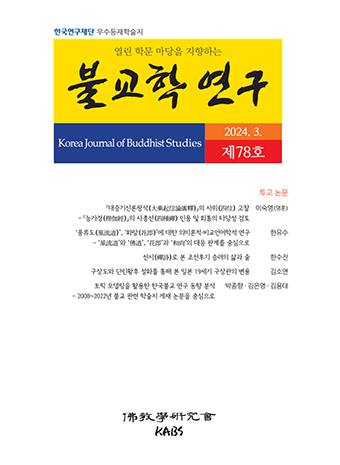Abstract
References
Sorry, not available.
Click the PDF button.
Information
This paper deals with the problems of Buddhist precepts in Korean Buddhism from the Japanese colonial period to the present day. Korean Buddhism suffered a distortion of its principles under the pressure of Japanese influence. Therefore, an examination of the colonial period is still necessary and relevant in order to explore the modern problems of Buddhist precepts. While the Joseon Dynasty had maintained a policy to promote Confucianism and suppress Buddhism, Japan had protected Buddhism even though they were foreign invaders. Buddhist monks were thus confused about which value should be preferred between ‘nation’ and ‘religion’ in the colonial period. The issue of precepts became even more complex when some objections were raised during this time that Korean Buddhism had been suppressed during the Joseon Dynasty because it did not accept the reformations of Japanese Buddhism, such as the permission to have wives. Chapter II thus deals with the problems of external impact and subjective awareness. Based on this, Chapter III deals with the characteristics of the precepts of Korean Buddhism, as well as institutional arrangements following the creation of the Jogye Order of Korean Buddhism. The ideological foundation of Korean Buddhist precepts come from the ‘Seosangsugye (瑞祥受戒)’ and ‘Daeseungbosal (大乘菩 薩, mahāyāna bodhisattva)’ faith. These unique features were transmitted to Korean Buddhism through Jajang and Jinpyo. Jaun's reclamation of these features in the modern era gave the Jogye Order the legitimacy to secure its ordaining tradition based on the precepts of Korean Buddhism. Now, modern Korean society is gradually moving from an age of function to an age of ethics. In this present multi-religious environment, Buddhist precepts and ethics are becoming an important standard to discern the value of a religion. Therefore, refreshing viewpoints and establishing a future direction on the issue of Buddhist precepts and ethics is a problem of the utmost urgency.
본고는 일제강점기에서 현대에 이르는 한국불교의 계율문제를 짚 어본 것이다. 한국불교는 일제강점기라는 외세에 의한 기형적인 굴절 을 겪게 된다. 그러므로 이 부분은 현대의 계율문제와 관련해서도 반 드시 검토되어야할 필연적인 타당성을 확보한다. 먼저 제Ⅱ장에서는 일제강점기 한국불교의 계율문제에 관해 정리 해 보고자 하였다. ‘조선조라는 숭유억불 상황’과 ‘일제라는 외세지만 불교옹호의 입장’의 차이는, 당시 승려들로 하여금 ‘국가’와 ‘종교’ 중 어떤 가치를 우선할 것이냐에 있어서 혼란을 초래하기에 충분했다. 특 히 조선조에 억눌렸던 불교의 문제가 일본불교의 帶妻와 같은 개혁성 을 수용하지 않은 때문이라는 관점까지 제기되면서, 계율의 문제는 보 다 복잡하게 표류한다. 즉, 제Ⅱ장은 외부적 충격과 주체적 자각의 문 제를 다루어 보고자 한 것이다. 이를 바탕으로 제Ⅲ장에서는 한국불교 계율의 특징과, 조계종 종단 출범 이후의 제도정비 및 계율의 문제를 다루어 보았다. 한국불교의 계율적인 특징은 ‘瑞祥受戒’와 ‘大乘菩薩信仰’이다. 이는 자장과 진표 등을 통해서 살펴지는 한국불교적인 특수성이다. 이와 같은 양상을 현 대의 자운이 재천명하므로 인하여, 비로소 조계종은 한국불교적인 계 율에 입각한 수계전통을 확보할 수 있게 된다. 현대 한국사회는 점차 기능의 시대를 탈피하여 윤리의 시대로 전환 되고 있다. 오늘날 다종교라는 현실 속에서, 계율과 윤리문제는 이제 종교의 명암을 가르는 중요한 판단기준으로 작용하고 있다. 그러므로 계율과 윤리문제에 대한 관점환기와 방향정립은, 그 어떤 가치보다도 시급을 요하는 사안이라고 판단된다.
Click the PDF button.
- Publisher :Korean Association of Buddhist Studies
- Publisher(Ko) :불교학연구회
- Journal Title :Korea Journal of Buddhist Studies
- Journal Title(Ko) :불교학연구
- Volume : 35
- No :0
- Pages :211 ~ 249


 Korea Journal of Buddhist Studies
Korea Journal of Buddhist Studies






